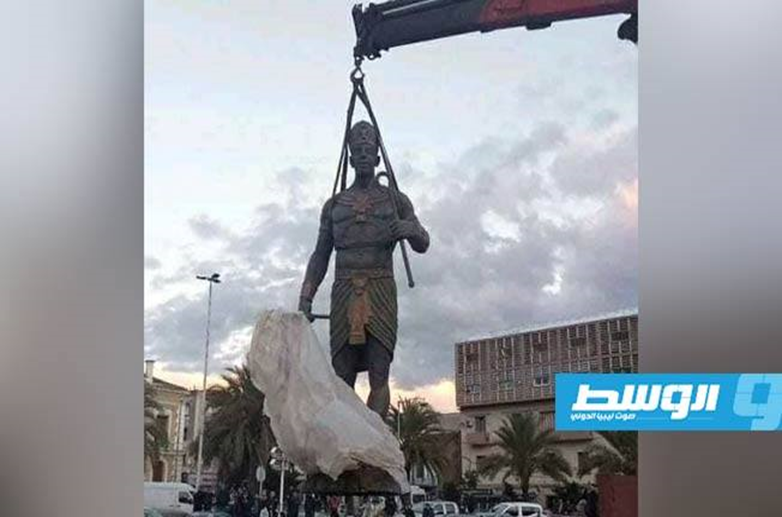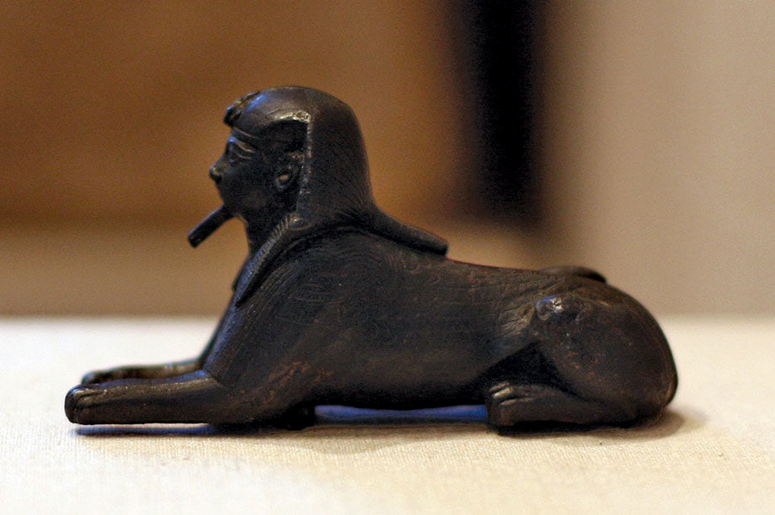Controversy surrounding the Amazigh king “Sheshenq” after a statue of him appeared in Algeria

A statue of the Amazigh king “Sheshenq” in Algeria (Center Gate).
The erection of a statue of the Amazigh king of Libyan origin, Sheshenq, at the entrance to the city of Tizi Ouzou, eastern Algeria, sparked controversy in the country, and its repercussions reached Egypt.
The debate coincided with the holding of celebrations in North Africa for the Amazigh New Year between January 11, 12 and 13 of each year, which this year corresponds to the Amazigh calendar year 2971.
The historical origin of Sheshenq
The Libyan "Sheshenq", or as it is sometimes pronounced "Sheshnak", is one of the most famous Amazigh names in North Africa. Historians consider him to have defeated the Egyptian pharaoh, Ramesses III, and established a history for the Amazighs in the land of Egypt.
His rule was called the 22nd Dynasty, which was founded in the year 945 BC by Sheshenq (945 BC - 924 BC), as he expanded the borders of Pharaonic Egypt to include the Levant, Libya, and Sudan in one kingdom, according to some historical research.
Historians confirm that Sheshenq's name was mentioned in the Torah, specifically in the Book of Kings, after he seized the city of Jerusalem, now Jerusalem. To this moment, relics of King Sheshenq are still present in multiple museums, such as the Brooklyn Museum in New York City, which houses the Sphinx of King Sheshenq, which is in good condition.

While Algerians found a space on social networking sites to express their approval of the idea of immortalizing a historical figure of Sheshenq’s stature, others expressed their rejection on religious grounds by erecting a statue of him in the middle of the Kabylie city of Tizi Ouzou. That is, it is forbidden to statue Sheshenq in Tizi Ouzou, and it is permissible to statue Uqba ibn Nafi in Biskra. A strange logic: Statues of Arab origin remain silent and do not issue any fatwas against them, and in return they declare erecting statues of Amazigh elites a disbelief. As for some of them, they found the idea strange because the character had no connection to Algeria, but rather originated from Libya, as if the Libyans were a different people: Aren’t they Amazighs like the rest of the North African population?
Algerian journalist Noureddine Khattaal criticized one of the local radio stations that covered the topic of “Sheshnak” and wrote, “The journalist of Radio Al-Bahja is repeating the barbarian lie that says that the Pharaonic king Sheshnak fought Ramesses II.” Then he continued, “Ramses II lived between (1303 BC - 1213 BC) and Sheshnak of Libya lived between (950 BC - 929 BC). The difference between them is 200 years, so how could he fight him?”
This Arab fanatic is known for his hostility to the Amazighs through his dirty media campaigns towards them. No one mentioned Ramesses II and linked him to the history of King Sheshenq. The problem concerns him is that he does not differentiate between Ramesses II and his grandson Ramesses III, so he must reread history and stop being stupid instead of accusing others of stupidity.
While historians agree that “Sheshnak” fought the Pharaonic King Ramesses III, Khatal insists that the story occurred during the reign of Ramesses II, and this behavior is considered the greatest foolishness, and foolishness is a disease that has no cure.

“Sheshnak is an Egyptian, the son of an Egyptian.”
Pictures of the installation of a statue of Sheshenq in an Algerian state also caused reactions in Egypt, prompting some to launch a “hashtag” on Twitter under the hashtag “Sheshenq is Egyptian.” Egyptian researcher Mohamed Al-Idrissi was surprised, according to a post on Facebook pages, by what he described as “pictures of the fake statue of the Egyptian King Sheshenq I,” which was installed in the middle of an Algerian city.
Al-Idrisi said that he has conclusive evidence that “he is an Egyptian, the son of an Egyptian, and I even have what he wrote down in his handwriting on his temples and about his biography that he wrote as a revered Egyptian pharaoh of a holy land.” He stressed, "I do not have any bad intentions against the Amazigh, on the contrary, they have all respect, but I am forced to defend the history of my country and my ancestors."
In response to Al-Idrissi, we do not deny Sheshenq’s Egyptian nationality, just as we do not deny Zidane’s French nationality. However, their Amazigh origins cannot be denied.
With the start of the Amazigh New Year, everyone exchanges congratulations, and sweets are distributed to the children in the hope of providing them with livelihood, in addition to preparing dishes of couscous and harissa, which consist of wheat grains, in addition to all types of known grains, marking a fertile agricultural year. Amazigh, a word that means free and noble.
In Algeria, the High Commission for the Amazigh Language, a public institution responsible for promoting the Amazigh language and culture, chose the state of Batna, which is located 430 km southeast of the capital, Algiers, to host national and official celebrations, between January 9 and 12, 2021. As for Libya, the General Authority announced Culture officially celebrates the Amazigh New Year, through several cultural and artistic events.

The authority published on its website, “The General Authority for Culture is organizing a ceremony on the occasion of the Amazigh New Year 2970, under the slogan (National identity brings us together. - Tamaget Tanamurt Taqnang) on Tuesday, January 12, 2021 at the Rixos Hotel in Tripoli.”
Source: websites

